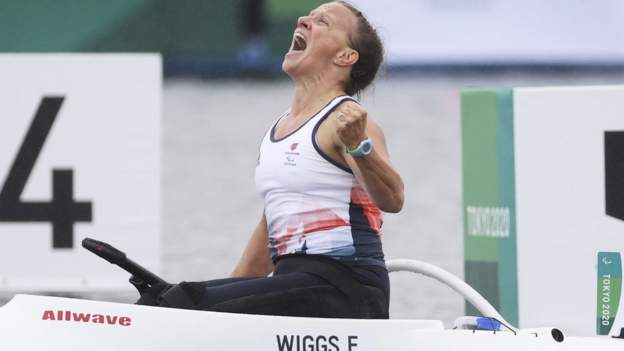| Venue: Tokyo, Japan Dates: 24 August-5 September Time in Tokyo: BST +8 |
| Coverage: Follow on Radio 5 Live and on the BBC Sport website |
Great Britain won three more gold medals as they passed the 100-medal mark at the Tokyo Paralympics and started day 10 on a high.
The golds went to canoeist Emma Wiggs and athletes Jonathan Broom-Edwards and Owen Miller.
Wiggs was victorious in the VL2 200m event – the first time that the Va’a boat, which is an outrigger canoe with a support float and is used with a single-bladed paddle – has been raced at the Paralympics.
She will aim to defend her KL2 kayak title on Saturday.
World T44 high jump champion Broom-Edwards, a silver medallist in Rio, went one better this time by clearing 2.10m with his second attempt for gold after he needed three efforts at 2.07m.
Miller, making his Paralympic debut, put in a strong final lap to win the T20 1500m in three minutes 54.57 seconds, ahead of Russian Alexander Rabotnitskii.
However, Richard Whitehead lost out to South African 19-year-old Ntando Mahlangu in his bid to win a third 200m title in row and defending champion Hollie Arnold could only take bronze in the F46 javelin.
Arnold led going into the final round of her event but was overhauled by both world record holder Hollie Robinson from New Zealand and Dutchwoman Noelle Roorda who took gold and silver.
On the final day of the swimming programme, there was heartbreak for Britain’s Stephen Clegg who was beaten to gold by 0.06 seconds in the final of the S12 100m butterfly.
Clegg, the world record holder, who had won two bronzes earlier, lost out to Raman Salei of Azerbaijan.
“I came here to win and I was short of where I wanted to be,” he told Channel 4 after clocking 57.87 seconds.
There was also silver for wheelchair tennis pair Gordon Reid and Alfie Hewett in the men’s doubles, the tandem pair of Sophie Unwin and her pilot Jenny Holl in the women’s B road race and for the class 6-7 table tennis team of Will Bayley and Paul Karabardak.
And Beth Munro has created history by becoming Britain’s first Paralympic medallist in taekwondo. The 28-year-old from Liverpool goes in the -58kg final at 13:00 BST against four-time world champion Lisa Gjessing of Denmark.
There were also bronzes for Jeanette Chippington, Rob Oliver and Hannah Taunton.
Reid and Hewett lost out in a final-set tie-break to Stephane Houdet and Nicolas Peifer in a repeat of the Rio final which the French pair also won.
The match, which lasted for three hours and 25 minutes, was won by Houdet and Peifer 7-5 0-6 7-6 (7-3).
Unwin and Holl beat Sweden’s Louise Jannering and Anna Svaerdstroem in a sprint for silver after Ireland’s Katie-George Dunlevy and Eve McCrystal made a late charge for gold.
Bayley and Karabardak faced a tough task against the Chinese pairing of Liao Keli and Yan Shuo and having lost the opening doubles, Bayley was beaten in his singles match as their opponents wrapped up a comfortable win.
Chippington, 51, who is competing in her seventh Games having made her debut as a swimmer in Seoul in 1988, finished third behind Wiggs while there was also bronze for team-mate Oliver in the KL3 event.
And Taunton, who like Miller competes in the T20 category for athletes with an intellectual impairment, ran a personal best to grab bronze in her 1500m final.
Later, the GB men face Japan in the last four of the wheelchair basketball (12:45).
Wiggs paddles to glory
Wiggs won gold when Para-canoe made its debut in Rio but had wrist surgery in 2018 which left her fearing for her sporting future.
She had a tough rehabilitation which she described as leaving her “feeling completely lost and probably for the first time in my life I felt disabled, with a little wrist injury”.
Back to full fitness, she led from the front to win in 57.028 seconds, more four seconds clear of Australia’s Susan Seipel with Chippington third.
“It does feel just incredibly emotional,” she added. “I’m just so overwhelmingly grateful to the Japanese people and the organising committee to get these Games on. It was so important for the continued progression of Paralympic sport that we were here.
“I love the fact I can leave my wheelchair on the side of the lake and paddle off and no-one walking their dog can tell which bits of you work and which bits don’t.”


